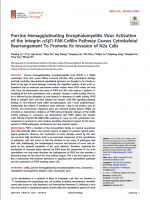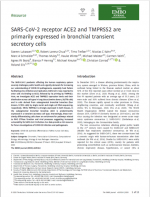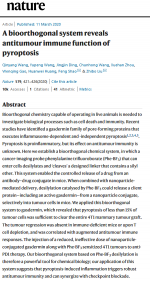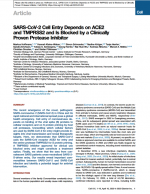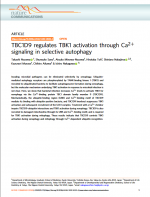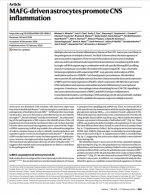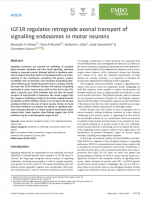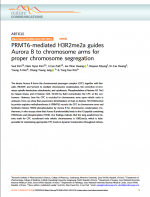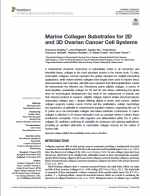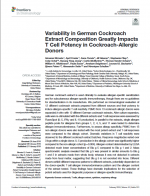05.05.2020
Porcine Hemagglutinating Encephalomyelitis Virus Activation of the Int... Journal of Virology, 2019
PHEV, a member of the Coronaviridae family, is a typical neurotropic virus that primarily affects the nervous system of piglets to produce typical neurological symptoms. However, the mechanism of nerve damage caused by the virus has not been fully elucidated. Actin is an important component of the cytoskeleton of eukaryotic cells and serves as the first obstacle to the entry of pathogens into host cells. Additionally, the morphological structure and function of nerve cells depend on the dynamic regulation of the actin skeleton. Therefore, exp...
27.04.2020
SARS-CoV-2 receptor ACE2 and TMPRSS2 are primarily expressed in bronch... The EMBO Journal, 2020
The SARS-CoV-2 pandemic affecting the human respiratory system severely challenges public health and urgently demands for increasing our understanding of COVID-19 pathogenesis, especially host factors facilitating virus infection and replication. SARS-CoV-2 was reported to enter cells via binding to ACE2, followed by its priming by TMPRSS2. Here, we investigate ACE2 and TMPRSS2 expression levels and their distribution across cell types in lung tissue (twelve donors, 39,778 cells) and in cells derived fr...
20.04.2020
A bioorthogonal system reveals antitumour immune function of pyroptosi... Nature, volume 579
Abstract Bioorthogonal chemistry capable of operating in live animals is needed to investigate biological processes such as cell death and immunity. Recent studies have identified a gasdermin family of pore-forming proteins that executes inflammasome-dependent and -independent pyroptosis1,2,3,
01.04.2020
SARS-CoV-2 Cell Entry Is Blocked by a Clinically Proven Protease Inhib... CELL, 2020
As described in their recent Cell study, Hoffmann et al. identified the serine protease TMPRSS2 as a critical factor in the priming of the SARS-CoV-2 spike protein with its receptor ACE2, and demonstrated that a clinically proven protease inhibitor, camostat mesylate, is able to interfere with SARS-CoV-2 infection of lung cells. Featured Products: SARS-CoV / SARS-CoV-2 (COVID-19) spike antibody [1A9] (GTX632604) SARS-CoV / SARS-CoV-2 (COV...
24.03.2020
TBC1D9 regulates TBK1 activation through Ca2+ signaling in selective a... Nature Communications , 11
Abstract Invading microbial pathogens can be eliminated selectively by xenophagy. Ubiquitin-mediated autophagy receptors are phosphorylated by TANK-binding kinase 1 (TBK1) and recruited to ubiquitinated bacteria to facilitate autophagosome formation during xenophagy, but the molecular mechanism underlying TBK1 activation in response to microbial infection is not clear. Here, we show that bacterial infection increases Ca2+ levels to activate TBK1 for xenophagy via the Ca2+-binding protein TBC1 domain family member 9 (TBC1D9). Mechanisticall...
16.03.2020
MAFG-driven astrocytes promote CNS inflammation Nature, 2020
Multiple sclerosis is a chronic inflammatory disease of the CNS1. Astrocytes contribute to the pathogenesis of multiple sclerosis2, but little is known about the heterogeneity of astrocytes and its regulation. Here we report the analysis of astrocytes in multiple sclerosis and its preclinical model experimental autoimmune encephalomyelitis (EAE) by single-cell RNA sequencing in combination with cell-specific Ribotag RNA profiling, assay for transposase-accessible chromatin with sequencing (ATAC-seq), chromatin immunoprecipitation with sequencing (ChIP...
24.02.2020
IGF1R regulates retrograde axonal transport of signalling endosomes in... EMBO Rep, 2020
Signalling endosomes are essential for trafficking of activated ligand–receptor complexes and their distal signalling, ultimately leading to neuronal survival. Although deficits in signalling endosome transport have been linked to neurodegeneration, our understanding of the mechanisms controlling this process remains incomplete. Here, we describe a new modulator of signalling endosome trafficking, the insulin‐like growth factor 1 receptor (IGF1R). We show that IGF1R inhibition increases the velocity of signalling endosomes in motor neuron axons,...
10.02.2020
PRMT6-mediated H3R2me2a guides Aurora B to chromosome arms for proper... Nature Communications volume, 2020
Enjoy this exciting article by Kim et. al that was recently published in Nature Communications. The authors were finally able to show that H3R2me2a is the key histone mark for CPC recruitment onto mitotic chromosomes. Furthermore, results of this work support the interesting concept of arginine methylation as a dynamic process. Abstract The kinase Aurora B forms the chromosomal passenger complex (CPC) together with Borealin, INCENP, and Survivin to mediate chromosome condensation, the correction of erroneous spindle-kinetoch...
13.01.2020
Marine Collagen Substrates for 2D and 3D Ovarian Cancer Cell Systems Front. Bioeng. Biotechnol., 2019
The recent publication in the journal Frontiers in Bioengineering and Biotechnology titled ‘Marine Collagen Substrates for 2D and 3D Ovarian Cancer Cell Systems’ has demonstrated that jellyfish collagen provides a reliable in vitro micro-environment for the proliferation and migration of Ovarian cancer cells. (OvCa.3 & SKOV.3). Cancer biology remains one of the biggest challenges of this century. There were 7,470 new cases of ovarian...
06.01.2020
Variability in German Cockroach Extract Composition Greatly Impacts T... Front Immunol., 2019
What has a German cockroach to do with allergen-specific immunotherapy, you may ask? Well, read the following article by Birrueta et al. and find out … Abstract German cockroach extract is used clinically to evaluate allergen-specific sensitization and for subcutaneous allergen-specific immunotherapy, though there are no guidelines for standardization in its manufacture. We performed an immunological evaluation of 12 different cockroach extracts prepared from different sources and their po...



